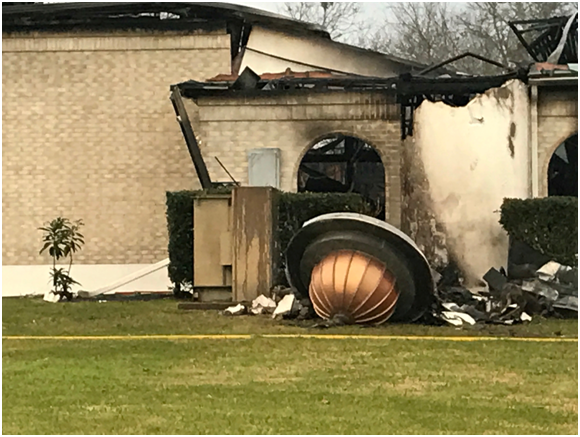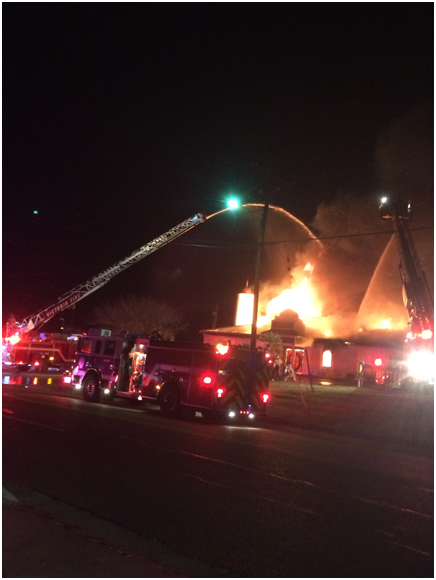A few summers ago, Razwan Mughal, a board member of Masjid an-Nur in Maryland, found bullet holes in the windows of the mosque. Luckily, no one was in the mosque at the time of the shooting. But with a surge in hate crimes against mosques since the start of the presidential election campaign, and living just off the main road from where people would scream racial slurs, Mughal wanted to make sure the mosque was prepared in the event of another shooting. In May, the mosque approached the Council on American-Islamic Relations to hold an active-shooter training at the mosque.
An expert from the Department of Homeland Security conducted the workshop that was attended by Sunday School children, mosque board members and adults in the community. The expert taught how to engage with a possible shooter and the ways in which body language could be used to convey information to an assailant.
With Ramadan underway, the mosque is still concerned about people from the main road screaming slurs at worshippers. “Every Ramadan there are people who go by the main road and heckle at us,” Mughal said. “That is continuous. That always happens. That is anticipated.”
Despite these concerns, the mosque has not increased security during Ramadan. “We have no security, unfortunately,” Mughal said laughing, recognizing the irony. “We should have security, but we don’t.”
With the rise in hate crimes against Muslims, mosques across the country are becoming progressively concerned about security. Ramadan signals an increase in congregants gathering in mosque spaces for nightly prayers, events and socializing. This makes mosques anxious about possible anti-Muslim incidents and they are responding with surveillance efforts to varying degrees and actions. For many, this has become a form of self-empowerment to keep their communities safe.
According to an investigation by The Islamic Monthly, there were more than 40 reported anti-Muslim incidents and crimes against mosques in 2017 alone. The actual figure is likely higher as many incidents of vandalism, threats and harassment go unreported. CAIR, additionally, has seen a spike in the number of requests for its mosque safety kit, which includes information on how to secure mosque premises and suggestions for creating a list of contacts in case of an emergency.

The aftermath of the Victoria mosque fire. Photo via Dr. Shahid Hashmi
Having training and prevention plans in place allows Muslim communities to empower themselves, said Zainab Chaudry, spokeswoman and Maryland outreach manager for CAIR. “It’s heartening that mosque leaders are being proactive and taking the initiative to do their due diligence to protect communities that are most vulnerable.”
Faith leaders beyond the Muslim community are also concerned about safety in the current political climate. Institutions of worship are meant to be open and easily accessible, making them a soft target for violence.
“Jewish leaders, Black church leaders, Sikh leaders, Hindu leaders are all reevaluating how their houses of worship operate,” Chaudry said, “whether they have safety plans, emergency plans in place that their leaders can reference and their community can also access.”
The rise in requests for CAIR’s mosque safety kits is reflective of the concerns of many mosque leaders across the U.S. Abdelkhalek Elnakib, imam of Omar Mosque in Paterson, New Jersey, and his community are worried about hate crimes during Ramadan. “The Muslim community feels threatened by the political rhetoric.”
One month ago, there was a break-in at Omar Mosque, where televisions and a donations box were stolen. There was no evidence the burglary was a hate crime, but safety nonetheless remains a worry. The mosque has developed a close relationship with its local law enforcement in Paterson, who advise them on safety and security issues. The mosque has taken precautions to install an alarm system and cameras, and has begun locking the building between prayer times. During Ramadan, when the mosque serves over 500 congregants, it will be employing two to three security guards to ensure the community’s safety.
The Islamic Center of the Capital District (ICCD) in Albany, New York, has also turned to fostering a strong relationship with its sheriff’s department, which provides it with safety and security recommendations. In the past, the sheriff’s department suggested the mosque increase lights in the parking lot and install signs outside alerting people to the presence of surveillance cameras across the mosque property to help deter crimes.
Imran Siddiqui, a board of trustee at ICCD, said there has always been a concern about hate crimes, but more so since the election. Fortunately, the mosque has not had any issues with hate crimes in the past years. However in 2013, the FBI alerted ICCD that it was the target of a plot carried out by two General Electric employees, who planned to build a radiation weapon to kill Muslims.
The mosque decided to take extra security measures after the presidential election. Siddiqui noted that, “In January, after Trump came into office, we were able to have a deputy come to the masjid every Friday during prayer. During Ramadan, they will do several drive-throughs of our property.”
There have also been an alarming number of mosque burnings this year. Four mosque fires — in Victoria, Texas; Bellevue, Washington; Tampa, Florida; and Ypsilanti, Michigan — have been officially ruled arsons.

The Victoria mosque burning. Photo via Dr. Shahid Hashmi
Muslim Advocates, a national legal, advocacy and educational organization for American Muslims, issued a notice during Arson Awareness Week in early May, sponsored by the U.S. Fire Administration of the Federal Emergency Management Agency. The notice was released to mosques nationwide, encouraging them to take arson prevention measures during Ramadan.
Madihha Ahussain, special counsel for anti-Muslim bigotry at Muslim Advocates, said Ramadan is a good time to start conversations around safety with mosque leaders while being mindful not to cause alarm.
“It’s perfectly normal for people to want to be more careful,” she said. “But people should feel like they can freely practice their faith, which we know can be challenging. We hope these resources will help people feel more comfortable and safe.”
*Image: The Islamic Center of America, in Dearborn, Michigan. Flickr/TheB’s.





